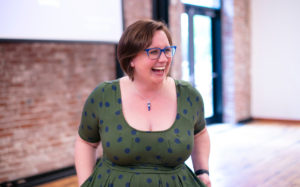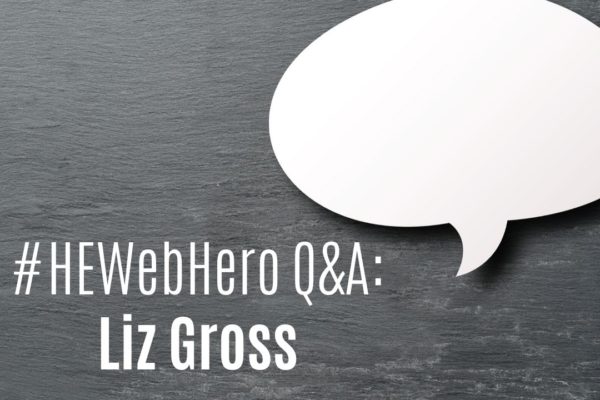
We asked our HEWeb community, who is your #HEWebHero?
Liz Gross is the founder and CEO of Campus Sonar, but some may know her better for her Twitter presence. Liz, along with the Campus Sonar team, has been sharing a number of helpful resources surrounding how higher education institutions are being impacted by COVID-19. The world is changing fast, but Campus Sonar is keeping up!
Link: What is the key benefit for higher education institutions to implement a social media listening plan during these times?
Liz: You asked for one, but I’m going to give you two.
Demonstrating community concern: Students, their families, and your accepted and prospective students are worried and stressed. While some of their concern is coming to you through traditional channels, or directly into your social media feeds via @mentions, DMs or common campus hashtags, others are broadcast on Twitter, YouTube, Reddit and Tumblr (yes, Tumblr) without tagging your campus. Finding all of these mentions allows you to respond; analyzing them allows you to provide a data-driven update to leadership about the key concerns of your community.
Find and share the good: There are still happy and hopeful stories taking place during the pandemic. Alumni, students, faculty and staff who are helping their communities, providing vital information or services or simply offering a moment of hope should not be overlooked. If you’re not listening, you may miss opportunities to amplify their contributions to society and promote a feeling of goodwill and cohesion within your campus community.
Link: How should social media teams reconsider “listening” now that so many of us have had our routines seriously disrupted?
Liz: Social listening may seem like a herculean effort right now because there’s just so much conversation. If you can, delegate. Tony Dobies said it well in his recent article, “there are also two very clear roles for social media managers in a crisis (posting and monitoring), and it’s almost impossible to do them simultaneously and successfully.” Find help or delegate one of these tasks so you can focus on the other. Find efficiencies where you can, through software, zero budget automation like IFTTT, or a partner like Campus Sonar.
Link: Campus Sonar has developed a series of resources for higher education professionals. What should they expect?
Liz: Our Coronavirus Higher Education Briefings are a completely free resource to help you understand the trends in industry conversation about the pandemic. Every Tuesday afternoon we release a new Briefing analyzing conversation from the previous week. Each Briefing has two components: a blog post and a slide deck.
The blog post is basically a research report, but one you should be able to read in 5 to 10 minutes. It will cover trends in conversation volume, sentiment, sources and topics. We also do some audience segmentation to highlight what students are saying, and sometimes other audiences like family and friends, admitted students, prospective students and alumni. There are also recommendations for campuses to take action based on our analysis.
The slide deck is a summary of the Briefing, focusing mostly on the data. This is something you could present in a staff meeting, or steal a few slides to incorporate in another presentation of yours.
We’ve released 11 Briefings so far. You can also sign up to have the Briefings emailed to you as soon as they’re published.
Link: Based on the briefings Campus Sonar has developed, what predictions do you have for future social media conversation trends?
Liz: As campuses make their announcements about the fall semester, we’ll see a surge in conversation like we did in mid-March when classes went online. We’ll also continue to see students asking for advice on places like Reddit, Tumblr and YouTube on a variety of topics: if they should take a gap year, if they should enroll at a community college to save money or if they should reconsider their second or third choice schools because they’re local.
One thing I’ve noticed that I haven’t written in the Briefings is a rise in conversation from instructors. Sean Carton wrote about this for Inside Higher Ed. If faculty disagree with their institution’s decision regarding the fall, they may be vocal about it; potentially in places where students and their families will see it.
Link: So, who’s your #HEWebHero?
Liz: The 11 Sonarians I work with every day. Whether they’ve been in higher ed their entire career or just jumped in when they came to Campus Sonar, they’re committed to our vision of restoring the public’s trust in higher education and empowering colleges and universities. Their drive to help you (readers on campus) succeed is contagious. It’s an absolute privilege to work with them every day. And…Erin Supinka. I cried when she gave her red stapler presentation, and when she was presented with the best in conference award in 2018. I am so incredibly proud of her, and the work she’s doing at Dartmouth is absolutely phenomenal. She’s a hero for every campus social media manager.
Think someone should be nominated? Bring some good to your Twitter feed and use #HEWebHero to recognize someone who deserves it!

